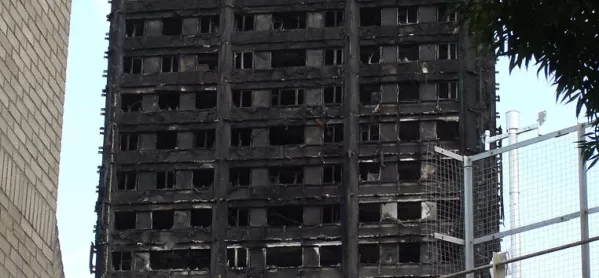A child excluded over poor behaviour after losing a relative in the Grenfell Tower fire has been held up as an example of the lack of support schools offer vulnerable pupils.
The case was raised at the launch of a new campaign to improve transparency over school exclusions by a teacher from a London pupil referral unit.
She suggested more could have been done to help the unnamed boy, whose behaviour deteriorated after the tragedy. The teacher declined to give any further details after the meeting and did not want to be publically identified.
But Jules Daulby - director of education at the Driver Youth Trust and one of the instigators of the new Transparency on Exclusion (TOP) campaign - said the case was one of many shocking examples she had come across.
“It is shocking that we have got to the point where schools think it is acceptable for a child that has experienced a deep trauma to further be abandoned by the system by being excluded,” she said.
She cited other instances, such as a six-year-old child with autism being home taught after the school threatened to exclude her.
The TOP campaign has been set up as concerns grow over the lack of transparency regarding pupils that “disappear” as a result of exclusion - official or unofficial - from school.
It wants to shine a light on the true scale of the problem in terms of children outside mainstream education and those not receiving any education at all.
The campaign says exclusion data is too opaque and gives little information on what is happening to thousands of marginalised children in the country.
Addressing the launch meeting, held on Saturday in central London, Tim Taylor, a former primary school teacher, expressed his concerns over children “massaged out” of the system through so-called off-rolling.
Mr Taylor, who works at mantle-of-the-expert, a consultancy that works with schools on using drama to share learning with pupils, said: “I think they are disappeared.”
“There are tens of thousands of children who are not attending mainstream or special schools and, in extreme cases, we simply don’t know what education they get,” he added.
Made up of teachers, experts and charities involved in alternative provision, TOP will also highlight good practice by schools that avoid resorting to exclusion wherever possible.
Figures show permanent exclusions have been on the rise in recent years, with four in five taking place in secondary schools. Department for Education figures for permanent and fixed term exclusions show there were 35 permanent exclusions and 1,790 fixed term exclusions per per day in England in 2015-2016.
Pupils with special educational needs made up over half of all permanent exclusions, despite making up only 14 per cent of the school population. Black Caribbean pupils were over three times more likely to be permanently excluded than the school population as a whole.
The children’s commissioner for England, Anne Longfield, recently raised concerns over pupils being excluded “by the backdoor” through hidden or unofficial exclusions.”
“In hundreds of mainstream schools, children with special educational needs are being illegally excluded because the school does not feel able to cope,” Longfield warned in a briefing to MPs last November. “Ofsted is concerned about this and the full extent of it remains unknown.”
Saturday’s meeting heard that TOP campaign group will run projects to unearth more detail on the types of exclusions and what can be done to avoid so many schools resorting to the practice to manage their schools.
Ms Daulby said transparency over exclusions was a social justice issue.
“The group currently have more questions than answers but one which came through very strongly is that ‘we just don’t know enough’ and that there is no evidence to show that exclusions work,” she said.
“England is going in a very different direction to Scotland and Wales with rising exclusions but where is the data and research?
“We hope to find out and make recommendations on how to improve transparency on children out of mainstream school.
“The campaign will ensure the most vulnerable in society, those with the fewest resources available to them are not ignored and receive their entitlement of a broad and balanced education.”





